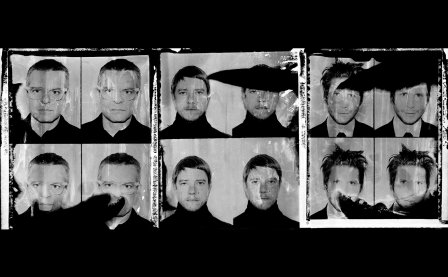There’s a moment at the very, very end of Interpol’s Our Love to Admire — a strong candidate for the Worst Album Art Ever award and, really and truly, the Worst Album Ever Period award, given out by… ME — wherein I heard the subtlety of debut Turn on the Bright Lights bubble up and sting my nose; I instantly did a sort of double-take-of-the-ear and skipped the track back a few times to make sure I was hearing things right. Sure enough, it’s there: it’s called “The Lighthouse,” and it foreshadowed a future free of the burdensome, trying-too-hard sunglasses-dark-pop of OLtA. Hell, it sounded like The Walkmen but maybe even better, fer chrissakes.
The atmospheric wonder of “Lighthouse” is not carried through the channels of Interpol’s new self-titled album, but there IS a slight sense the ship is being steered back into foggier waters, more suited for a late-night shimmer than a mid-day neck-jerk. Paul Banks and his crew began their stray from sensibility with the above-average Antics and absolutely TANKed it on Our Love, and to be honest I expected a lot less than I got from Interpol.
HAVING SAID THAT, this is still lukewarm Interpol, beginner’s stuff from a band that has weathered enough moons to know better. That it is an improvement over Our Love to Admire, now that I think about it, was a wriggling Given, a throbbing Certainty; but it’s telling that the strongest compliment I can give this eponymous step-in-the-right-direction is that it is a step in the right direction.
The good news is, Interpol remain better than Editors and the imaginationless drones, and are more than capable of delivering another devastating album. That album, however, is not Interpol, though it could be said, perhaps, that Interpol could serve as a frail blueprint of That Album and hopefully spell the end of the Julian Plenti era, songs like “Memory Serves,” with its nasty duel riff and slow grind, acting as great tablets for them to carry over their next mountaintop.
I sense a more natural sense of songcraft here. Banks is still trying too hard, seemingly attempting to write songs he thinks people will like rather than songs that, whether simple or arpeggio-filled, he and his mates like. There’s little to latch onto, few of the stirring up-and-down dramatics of Bright Lights, and too much of the bluster that caused me to make some pretty spot-on, this-band-is-going-to-fall-off-next-album-ish predictions when Antics came out (and yes, all of the people I related these concerns to are either dead, in jail, or Dead To Me, so don’t try to investigate my claims).
Interpol made such an impression on me with their debut album, sections of the sophomore effort, and by dint of a slot on the Sasquatch fest years ago that I’m likely always going to give their successive albums a try. Whether they reward my ongoing attention — and maybe yours — is an open question.
More about: Interpol




